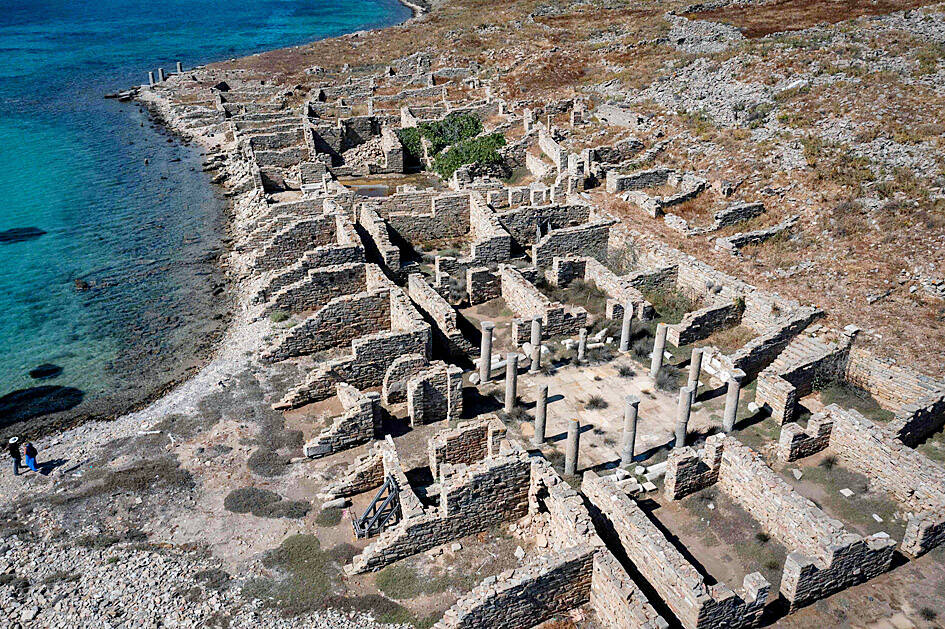A brief boat ride from the thrumming nightclubs of Mykonos lies the UNESCO heritage site of Delos, one of the most important sanctuaries of the ancient Greek and Roman world.
Surrounded by piercing azure waters, Delos’ 2,000-year-old buildings offer a microcosm of information on daily life during the Hellenistic and Roman periods.
However, the site known for its temples guarded by stone lions could be gone forever in half a century, scientists warn.

Photo: AFP
“Delos is condemned to disappear in around 50 years,” said Veronique Chankowski, head of the French archeological school of Athens, which has been excavating the site for the past 150 years under licence from the Greek state.
The tiny Aegean Sea island’s silent drama could not be more at odds with the bustle of neighboring Mykonos, which attracts hundreds of thousands of visitors annually.
The worst structural damage is visible in an area that once housed trade and storage buildings in the first and second centuries BC and is not accessible to visitors.
“Water enters the stores in winter. It eats away at the base of the walls,” said Jean-Charles Moretti, the French mission’s director on Delos and a researcher at the French state institute for the research of ancient architecture.
“Every year in the spring, I notice that new walls have collapsed,” said Moretti, who has taken part in digs on the island for the past 40 years.
In the space of 10 years, the sea has encroached by up to 20m in some parts of the island, Chankowski said.
A study by Aristotelio University in Thessaloniki last year found that increasing temperatures combined with high levels of humidity can significantly affect the chemical composition of certain materials used in cultural heritage monuments.
“Just like the human body, monuments are built to withstand specific temperatures,” study supervisor Efstathia Tringa, a meteorology and climatology researcher at Aristotle University in Thessaloniki, told the Kathimerini daily earlier this year.
A steady stream of tourists from Mykonos, who often veer away from permitted areas, constitute an additional problem.
In the summer, only a handful of archeologists are at hand to supervise.
To the ancient Greeks, Delos was the birthplace of Apollo, god of light, arts and healing, and of his sister Artemis, goddess of the hunt.
The siblings were among the chief deities of the Greeks and the Romans.
At the height of its acclaim during the Roman era, Delos attracted pilgrims and traders from across the ancient world and ultimately grew to a bustling city of about 30,000 people.
However, the island’s popularity proved its undoing. It was looted twice in the first century BC and eventually abandoned altogether.
For now, wooden support beams have been used to shore up some walls, Chankowski said.
However, more robust measures are complex and will require a multi-disciplinary response, she added.
“All coastal cities will lose significant areas currently located at sea level,” said Athena-Christiana Loupou, a Greek archeologist who guides groups through the site’s main attractions.
“We replaced plastic straws with paper straws, but we lost the war” to protect the environment, she said.

Auschwitz survivor Eva Schloss, the stepsister of teenage diarist Anne Frank and a tireless educator about the horrors of the Holocaust, has died. She was 96. The Anne Frank Trust UK, of which Schloss was honorary president, said she died on Saturday in London, where she lived. Britain’s King Charles III said he was “privileged and proud” to have known Schloss, who cofounded the charitable trust to help young people challenge prejudice. “The horrors that she endured as a young woman are impossible to comprehend and yet she devoted the rest of her life to overcoming hatred and prejudice, promoting kindness, courage, understanding

Tens of thousands of Filipino Catholics yesterday twirled white cloths and chanted “Viva, viva,” as a centuries-old statue of Jesus Christ was paraded through the streets of Manila in the nation’s biggest annual religious event. The day-long procession began before dawn, with barefoot volunteers pulling the heavy carriage through narrow streets where the devout waited in hopes of touching the icon, believed to hold miraculous powers. Thousands of police were deployed to manage crowds that officials believe could number in the millions by the time the statue reaches its home in central Manila’s Quiapo church around midnight. More than 800 people had sought

DENIAL: Pyongyang said a South Korean drone filmed unspecified areas in a North Korean border town, but Seoul said it did not operate drones on the dates it cited North Korea’s military accused South Korea of flying drones across the border between the nations this week, yesterday warning that the South would face consequences for its “unpardonable hysteria.” Seoul quickly denied the accusation, but the development is likely to further dim prospects for its efforts to restore ties with Pyongyang. North Korean forces used special electronic warfare assets on Sunday to bring down a South Korean drone flying over North Korea’s border town. The drone was equipped with two cameras that filmed unspecified areas, the General Staff of the North Korean People’s Army said in a statement. South Korea infiltrated another drone

Cambodia’s government on Wednesday said that it had arrested and extradited to China a tycoon who has been accused of running a huge online scam operation. The Cambodian Ministry of the Interior said that Prince Holding Group chairman Chen Zhi (陳志) and two other Chinese citizens were arrested and extradited on Tuesday at the request of Chinese authorities. Chen formerly had dual nationality, but his Cambodian citizenship was revoked last month, the ministry said. US prosecutors in October last year brought conspiracy charges against Chen, alleging that he had been the mastermind behind a multinational cyberfraud network, used his other businesses to launder